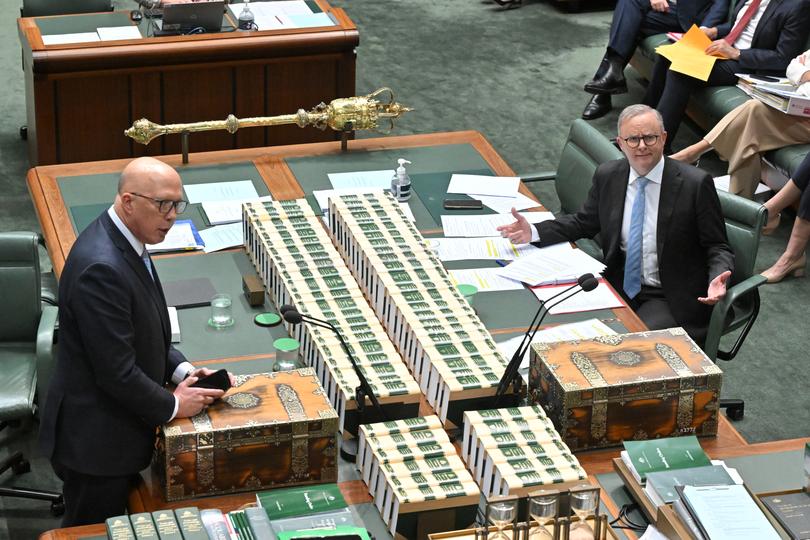MARK RILEY: Peter Dutton has used a timeless trick to make Anthony Albanese squirm over Gaza visa issue
MARK RILEY: It’s the oldest trick in the political book, and Peter Dutton is using it to perfection to make Anthony Albanese and his government look evasive, if not incompetent, all week.

There is a basic and, frankly, logical theory in politics that if something works the first time it is worth trying again.
It is a fundamental principle that most leaders are well-acquainted with.
Peter Dutton is among them.
Sign up to The Nightly's newsletters.
Get the first look at the digital newspaper, curated daily stories and breaking headlines delivered to your inbox.
By continuing you agree to our Terms and Privacy Policy.His attacks over the Government’s handling of the Palestinian visa issue prove that.
The controversy that erupted with Dutton’s call last week for a temporary ban on accepting Gaza refugees is almost a perfect rerun of a campaign he ran in November last year, a month after the murderous Hamas attacks on Israel.
Standing with child safety advocates in his northern Brisbane seat of Dickson on November 24, Dutton was questioned about the security checks being applied.
“The inadequacy of these checks could result in a catastrophic outcome in our country,” he warned.
“Taking people out of a war zone without conducting the checks, particularly those that are available to us in the US, is reckless.
“The Prime Minister, here, needs to hit the pause button.”
It is almost word-for-word the same comments he made at the return of the Olympic athletes in Sydney nine days ago, igniting the latest controversy.
Worth doing once, worth doing again.
It is surprising, then, that the Government has been unable to shut him down.
Instead, Dutton has exploited the issue to dominate the Parliament for four straight sitting days, ripping the agenda away from the Government and forcing it to defend its competency — yet again — on issues of national security.
It hasn’t all been bad. Anthony Albanese did hit his mark in question time on Monday and Wednesday, giving Dutton as much back as he got and more.
But his performance on Tuesday was curious, to put it mildly.

He point-blank refused to confirm figures revealed by 7NEWS showing that of the 2900 visas issued to Gaza Palestinians, 43 had been revoked and 20 of them later reinstated on appeal.
The Prime Minister said he wouldn’t be drawn into an answer on national security grounds.
Shadow immigration minister Dan Tehan had a field day. He asked five times for Albanese to confirm the numbers and was stonewalled five times.
It made the Prime Minister look evasive, even slippery, and questioned his promise of greater accountability and transparency in Government.
And for what? The number is hardly a national secret. It is contained in a background briefing note issued by his own Government.
Sources tell me that most, if not all, were cancelled because of concerns the holders might overstay their visas and not on any suspicion of being Hamas sympathisers.
But the absence of official information has created a vacuum that Dutton has easily been able to fill with warnings, such as that issued in November, that among the Gazans could be “one person, or could be 10 people” of concern.
And the “news” yesterday that Palestinian community leaders want the Gazans issued with protection visas rather than tourist visas was not news at all to those who’ve followed the issue closely.
Palestinian advocates have been saying that all along.
They’re worried the tourist visas give the Gazans no access to health or welfare support here. The protection visas do.
The security process for applying for a protection visa, though, is much more comprehensive, involving intelligence, criminal and identity checks.
That’s why Dutton wants them.
And the Government might now introduce them as the Gazans’ tourist visas expire.
Ministers have been arguing since last November, though, that the security checks thus far have been adequate.
Every Palestinian who has crossed the Rafah border — which, incidentally, has been closed since May — have had to pass Israeli checkpoints and be screened by Egyptian authorities before being assessed for Australian visas.
Anthony Albanese insisted this week that the security system was an ongoing process involving police and security organisations where necessary.
It is an argument he will need to refine and reapply over the coming months as Peter Dutton continues to capitalise on the secrecy and suspicion surrounding the process.
It has now worked for Dutton twice. And, according to the contemporary playbook of modern politics, it’s likely to work for him again.

